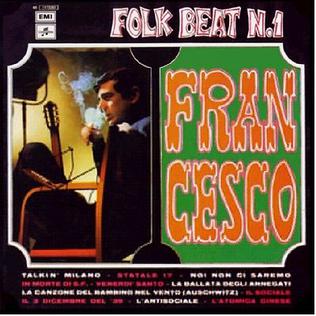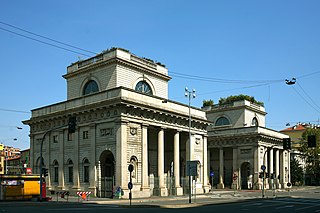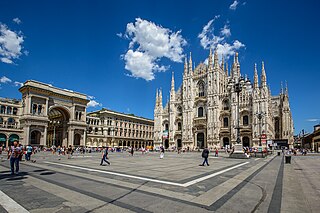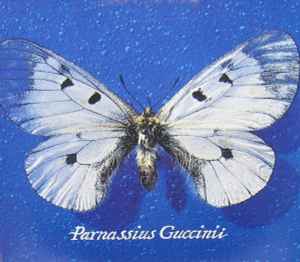
Francesco Guccini is an Italian singer-songwriter, actor, and writer. During the five decades of his music career he has recorded 16 studio albums and collections, and 6 live albums. He is also a writer, having published autobiographic and noir novels, and a comics writer. Guccini also worked as actor, soundtrack composer, lexicographer and dialectologist.

Achille Bonito Oliva is an Italian art critic and historian of contemporary art. Since 1968 he has taught history of contemporary art at La Sapienza, the university of Rome. He has written extensively on contemporary art and contemporary artists. He originated the term Transavanguardia to describe the new direction taken in the late 1970s by artists such as Sandro Chia, Francesco Clemente, Enzo Cucchi, Nicola De Maria, and Mimmo Paladino. He has organised or curated numerous contemporary art events and exhibitions; in 1993 he was artistic director of the Biennale di Venezia.

Folk beat n°1 (1967) is the first album of Italian singer-songwriter Francesco Guccini. It was published under the name "Francesco" alone.

Signora Bovary is an album of Italian singer-songwriter Francesco Guccini. It was released in 1987 by EMI.

Paolina Pezzaglia Greco was an Italian theatre and film actress.

Antonio Esposito is an Italian singer, songwriter and musician.

Girolamo Graziani was an Italian poet and diplomat.

L'isola non trovata is an album of Italian singer-songwriter Francesco Guccini. It was released in December 1970 by EMI, under the nickname "Francesco".

Carlo Francesco Pollarolo was an Italian composer, organist, and music director. Known chiefly for his operas, he wrote a total of 85 of them as well as 13 oratorios. His compositional style was initially indebted to the opera tradition of Giovanni Legrenzi and Carlo Pallavicino, but he moved beyond this style with innovations to the compositional structure of the aria characterized by expanded forms and orchestral elaborations. His early work used three part strings in the Legrenzi and Pallacino tradition of orchestration, but his mid and later works had developed into a richer orchestration of five strings parts and expanded instrumentation of brass and woodwinds. He was the first Venetian opera composer and one of the earliest Italian composers to use the oboe in his opera orchestrations.

Giuseppe Maria Orlandini was an Italian baroque composer particularly known for his more than 40 operas and intermezzos. Highly regarded by music historians of his day like Francesco Saverio Quadrio, Jean-Benjamin de La Borde and Charles Burney, Orlandini, along with Vivaldi, is considered one of the major creators of the new style of opera that dominated the second decade of the 18th century.

Porta Venezia, formerly known as Porta Orientale, Porta Renza and by other names, is one of the historical gates of the city of Milan, Italy. In its present form, the gate dates back to the 19th century; nevertheless, its origins can be traced back to the medieval and even the Roman walls of the city.

Guccini is an album by the Italian singer-songwriter Francesco Guccini, released in 1983.

The Zone 1 of Milan, since 2016 officially Municipality 1 of Milan, is one of the 9 administrative divisions of Milan, Italy.

Stagioni is the nineteenth album by Italian singer-songwriter Francesco Guccini. The title means seasons, and three of the songs of the album are named after a season. It was released in 2000 by EMI, and was at the top of the Italian album chart for one week.

Parnassius Guccinii is the sixteenth album by Italian singer-songwriter Francesco Guccini. The title references a butterfly subspecies named after the artist. It was released in 1993 by EMI and was generally well received.

Quello che non... is the fifteenth album by Italian singer-songwriter Francesco Guccini. It was released in 1990 by EMI.

Due anni dopo is the second album by Italian singer-songwriter Francesco Guccini. It was released in 1970 by EMI.
"Auschwitz" is a song composed by Francesco Guccini, and originally performed by Equipe 84. It was first released as the B-side of a cover of Sonny & Cher's "Bang Bang ", and later included in Equipe 84's album Io ho in mente te. Although the song was written by Guccini it was credited to Lunero and Maurizio Vandelli as the author at the time was not a member of the SIAE.
The Targa Tenco is a prize awarded annually by the Club Tenco. Founded in 1984, it has a large jury of 200 journalists and critics awarding the best works of the year. It is considered the most prestigious award in Italian music.
Mimmo Candito was an Italian war correspondent.
This page is based on this
Wikipedia article Text is available under the
CC BY-SA 4.0 license; additional terms may apply.
Images, videos and audio are available under their respective licenses.

















